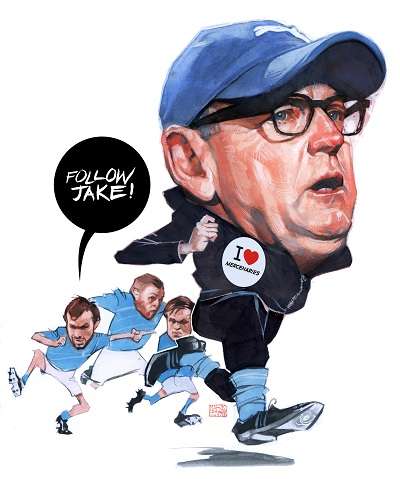Jake White’s mercenary march at Montpellier has been gathering a head of steam. South Africa’s 2007 World Cup-winning coach may have been spurned by England in favour of Eddie Jones, but his stint in the Top 14 has not done his reputation for building successful teams any harm.
Given that Montpellier are second in the Top 14 and will play Harlequins in the final of the European Challenge Cup next month, White’s policy of buying big from the Southern Hemisphere appears to be paying off at a club that was floundering prior to his appointment.
The 23-man Montpellier line-up that faced the Dragons in the Challenge Cup semi-final at the Altrad Stadium yesterday included eight South Africans, three Australians, two Fijians and a New Zealander, as well as two Georgians and a Cameroonian – leaving just six French players in the entire match squad. Of the Frenchmen, only three were in the starting 15, with just one – captain Fulgence Ouedraogo – in the pack.
For those who follow English Premier League football it is a familiar picture, with the English players in a minority at most clubs – and players who actually hail from their community catchment areas increasingly an endangered species.
There is a body of opinion that it does not matter where any player or coach comes from in professional sport just as long as the success, quality, and entertainment they bring matches the size of the wage and transfer bill they command.
It is a model that White has used at Montpellier – and mirrors the one that Mourad Boudjellal has employed so successfully at Toulon – and so far, so good. By bringing in a raft of foreign players, with the likes of Springbok hooker Bismarck du Plessis and his brother, Jannie, heading the charge, White has turned Montpellier into Top 14 contenders.
 The other side of the argument, equally strongly held, is that professional rugby clubs should be an active part of the communities that support them, and that the best way to build those links – and to create lasting success – is to foster local talent. This is done by setting up club academies and forging relationships with local clubs and schools.
The other side of the argument, equally strongly held, is that professional rugby clubs should be an active part of the communities that support them, and that the best way to build those links – and to create lasting success – is to foster local talent. This is done by setting up club academies and forging relationships with local clubs and schools.
It is the model that many believe works best for Rugby Union, myself included. A crucial element is that there is an automatic bond between supporters and homegrown players which goes far beyond the transfer market mentality of being at a club mainly because it offers the best financial package.
That’s not to deny that the transfer market has an important place in the club game, because, when it is used judiciously, it brings an injection of energy, ideas and enthusiasm through new players and coaches. However, it is a potent argument against allowing it to dominate a league at the expense of local talent, which is a clear danger with many of the clubs in the Top 14.
Montpellier’s closest counterpart in the Premiership are Worcester. Dean Ryan’s forays into the transfer market are understand- able given that his first and most important mission the season after winning promotion was to avoid relegation – and Springbok scrum-half Francois Hougaard proved almost instantly that he is one of those individual imports who can galvanise a team.
With the exception of Chris Pennell, homegrown players are now in short supply in the Warriors’ starting line-up, although over the next few years that might change because Ryan’s mission statement as rugby director includes the resurrection of Worcester’s once fertile academy.
It is interesting that Saracens, who are currently the Premiership champions and pacesetters, have recently started to see the benefits of a vibrant academy set-up. The club have gradually transformed in the last five years from being reliant on a hard-core of Springbok imports under Brendan Venter, to a side which have achieved a potent blend thanks to the arrival of more home-grown academy talent, like George Kruis, Jamie George, and Maro Itoje.
As a club without the benefit of deep and extensive community foundations, Saracens’ biggest challenge now is to build a regular 15,000 to 20,000 support base in north London and the adjoining home counties. That’s where provincial city/town clubs like Montpellier and Worcester have a head start, when and if they use it.























